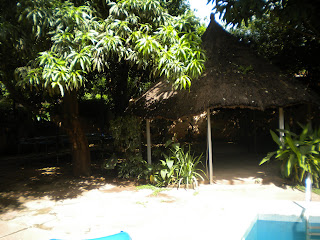There are a lotta “-ata”s here in Mali. Salimata, which is my given Malian name; Alminata, my football/soccer coach’s name; Halimata; Aissata; and in a category of its own is Fatoumata, the #1 most popular name I’ve come across. The secretary at my office has a daughter named Fatoumata. The captain of our soccer team is 28-year old Fatoumata. In my data collection for the women’s groups I can’t tell you how many times I’ve entered the name Fatoumata into an Excel spreadsheet. Then there are the Fatoumatas I meet everyday on the street.
A few days ago, I was walking on one such Malian street looking for bananas. After nearly two months away from home, I was needing some American flavor in my life and had big plans for making my friend Tori’s world famous banana bread. I asked our guard outside the gate if he knew where to find them, and was pointed in one direction. Minutes later and still “sans bananes”/”without bananas,” I asked the guard at the neighboring Senegalese Embassy if he knew where to find a banana stand; he pointed me in another direction. Still no luck. I next asked the guard at the “Palais de la Culture”...
There are a lotta guards in my up-scale neighborhood. Not a lotta bananas, apparently. It was getting close to evening, and it seemed as though the banana vendors were disappearing with the sunlight.
Asking the guards wasn’t giving me results, so I asked one of the female soft drink vendors who was carrying an ice chest on her head. She pulled down the ice chest and suggested I buy one of the local D’jino colas, in flavors like “Pamplemousse”/grapefruit and “Ananas”/pineapple. It was hard to turn this insistent girl down, but I declined, having bananas and not ananas on the brain.
She pointed me in a new direction even deeper into the neighborhood. Great. Thankfully she offered to walk me there. She said it was she and her friend who sold the bananas down the way and was there anything else she could help me buy?
On the way, she introduced herself: Fatoumata.
We found the precious bananas in holy territory: right next to the neighborhood mosque, which booms loud prayer chants every four hours from its outward projecting megaphones (like most mosques found in every neighborhood here). I stuffed my backpack with the fruit, and started heading towards Fatoumata’s home. She had invited me over, wanting to show me the “teinture”/cloth dying she, her mother, and sister did for a living. This 19-year old girl was a serious saleswoman.
We got to her home where there was an army of children crowding around Fatoumata’s mother, who was breastfeeding her youngest, and ninth, child. Fatoumata’s 17-year old sister was carrying her own 40-day old child wrapped to her back, and Fatoumata’s 3-year old son came running up to her. I thought the whole idea of having children at the same time as your mom was only a reality in the movie “Father of the Bride,” but it is very much a reality here in Mali!
Saleswoman Fatoumata convinced me to purchase one of their beautifully dyed “basins,” also called a “boubou.” A “basin” (pronounced “bay-zeinh”) is a large, formless dress that covers the entirety of your body like a giant Snuggie, but in a cool material rather than the hot felt shown in infomercials. I told them what colors I wanted and in what style, and after measuring me, Fatoumata walked me home. She’d bring the basin to the house when it was finished.
The finished product! Pictured with Fatoumata
My old friend Fatoumata came to the house a few days later with two of her sisters, equalling one third of her family’s brood. She showed me the colorful cloth they had dyed for the “tubabou’s” boubou. She unfolded the red and blue pattern, and I felt bad not being able to offer them the banana bread that I had since devoured. Instead, I offered the girls “jus de bissap”/bissap juice. Fatoumata nodded that she’d like a glass, but added: “mais tu sais ma mère est vendeuse de bissap avec gingembre?”/”but did you know my mother sells bissap juice with ginger?”
Fatoumata sells a lotta stuff.



















